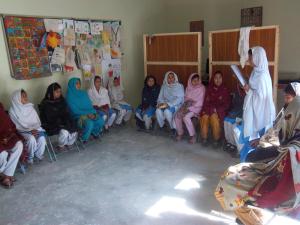Local foundation, Ali Hasan Mangi Trust talks to Charter for Compassion Pakistan about how they have begun to implement the Charter for Compassion in a rural fishing village in Sindh, Pakistan
—
Interview with Naween Mangi of Ali Hasan Mangi Trust
1. How did the foundation come up with the idea to try and implement the Charter in the village?
I had read Karen Armstron’s 12 Steps and Letter to Pakistan and simply loved both these books. I thought they really spoke to the type of work our trust has been trying to do in the village of Khairo Dero. It also made me thing about how we can really accomplish our developmental goals in Khairo Dero without truly bringing compassion into our thinking, planning, actions and work on the ground. Our greatest challenges in working with this village have been motivating people to take ownership of their village and participate in its development as well as getting them to look at the collective interests of everyone rather than focusing on their individual/family/neighborhood interests. Implementing the Charter in the community may be the best way to get around this. When our community center opened in November, we inaugurated it by putting up a frame containing the Charter of Compassion in English and Urdu. We also put the books in our library (and recently added the Urdu version of the Letter to Pakistan). Soon afterwards, we had been working with a group of young women on how women can gain economic empowerment through learning vocational skills (we offer candle making, jewelry making, block printing, copper foil work, ceramic flowers, traditional patchwork courses as well as computer and adult literacy) and how we may be able to then set up a women’s cooperative to produce and sell those products. We held a special meeting on the Charter in December where one woman read out the Charter to everyone and then they all shared their thoughts.
—
2. What other kinds of activities have you used to try and implement the Charter in the village?
One activity we began is a “Compassion Counter.” The ultimate aim of course is to bring compassion to our way of living but because the idea was new, we thought we could begin by recording acts of compassion as a way of taking small steps. So on the white board in our community hall we wrote the words compassion counter in the local language of Sindhi and the very next day one of the women in the meeting brought a sweater for the woman who is the cleaner at the center. It was bitterly cold and its a deeply impoverished village. The cleaner who comes to work at 7am was shivering and even though all the women you see in the meeting are also very poor, one of them donated a sweater to her. And we chalked up ONE on the counter, with an aim to read 1,000 very soon.
At the center we also run a literacy course for teenagers who have never been to school and they also take part in arts and crafts etc. So we’re also now introducing the compassion counter to them to encourage them to bring acts of compassion to their lives and the collective life of the village.
Another young woman raised the issue of how some communities/tribes within the village tend to think of themselves as superior to others because of land ownership or education levels. And then we all discussed how education or privilege of any kind should make us more rather than less compassionate. The group pledged to be mindful of this as they made progress in their education and skills development.
Women participating in a literacy session discuss the ‘Twelve Steps to a Compassionate Life’
Some of the participant comments:
[This process of 12 steps] “is beautiful because it is much easier to begin this practice of compassion in our families and our neighborhood,” said Parveen Kalhoro, a middle school student.
“The charter is leading us back to the Holy Quran which teaches us that our greatest benefit is from bringing benefit to others,” said Zahida Gachal, a teacher.
A few more inspiring comments below from the villagers:
- Following the charter will mean “no one in our village will remain helpless,” said Zahida, a teacher at a government school.
- Following the charter will not only “improve our lives by bringing goodness to the center of our lives but help change the lives of our people,” said Shahrbano, a student.
- “I learned from the charter the value of thinking for others what we think for ourselves,” said Parveen, another student. “This can only lead to the greater good.”
- “If we really want to bring about social change as we do in our village, then we must bring compassion into our daily lives,” said Mahjabeen, a teacher.
- [The charter is teaching] us an incredible lesson: that we should learn to feel the pain of others as keenly as we feel our own,” said Saira, a vocational trainer.


Keep spreading Compassion! Your story and efforts are beautiful!
love and light..
Anya
nice topic to discuss and was very informative . to understand its ideology we should do such efforts to promote compassion as skill .